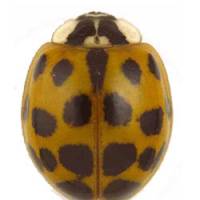NAGOYA (Kyodo) A team of researchers in Japan has successfully produced the world's first "wingless" ladybird beetle, paving the way for a new biological control agent, according to Britain's Insect Molecular Biology magazine published online on Tuesday.
The new ladybird could be used to efficiently get rid of harmful insects, such as ant cows, as the scope of their activities will be restricted because they are flightless, the researchers said.
While ladybird beetles have been used as eco-friendly pest killers both at home and abroad, how to keep them in field crops and prevent them from flying away has been a major challenge.
The team led by Teruyuki Niimi, associate professor at Nagoya University's Graduate School of Bioagricultural Sciences, identified a master gene for wing development, and used the RNA interference technique to disrupt the gene's function, according to the journal.
Niimi said the new technique is unlikely to affect the ecosystem as it differs from genetic modification and that the ladybirds' offspring will be born with wings just like normal ones.
He said one of the next steps would be to mass produce such flightless ladybirds, adding that the new technique can be applied to other insects for biological control.



